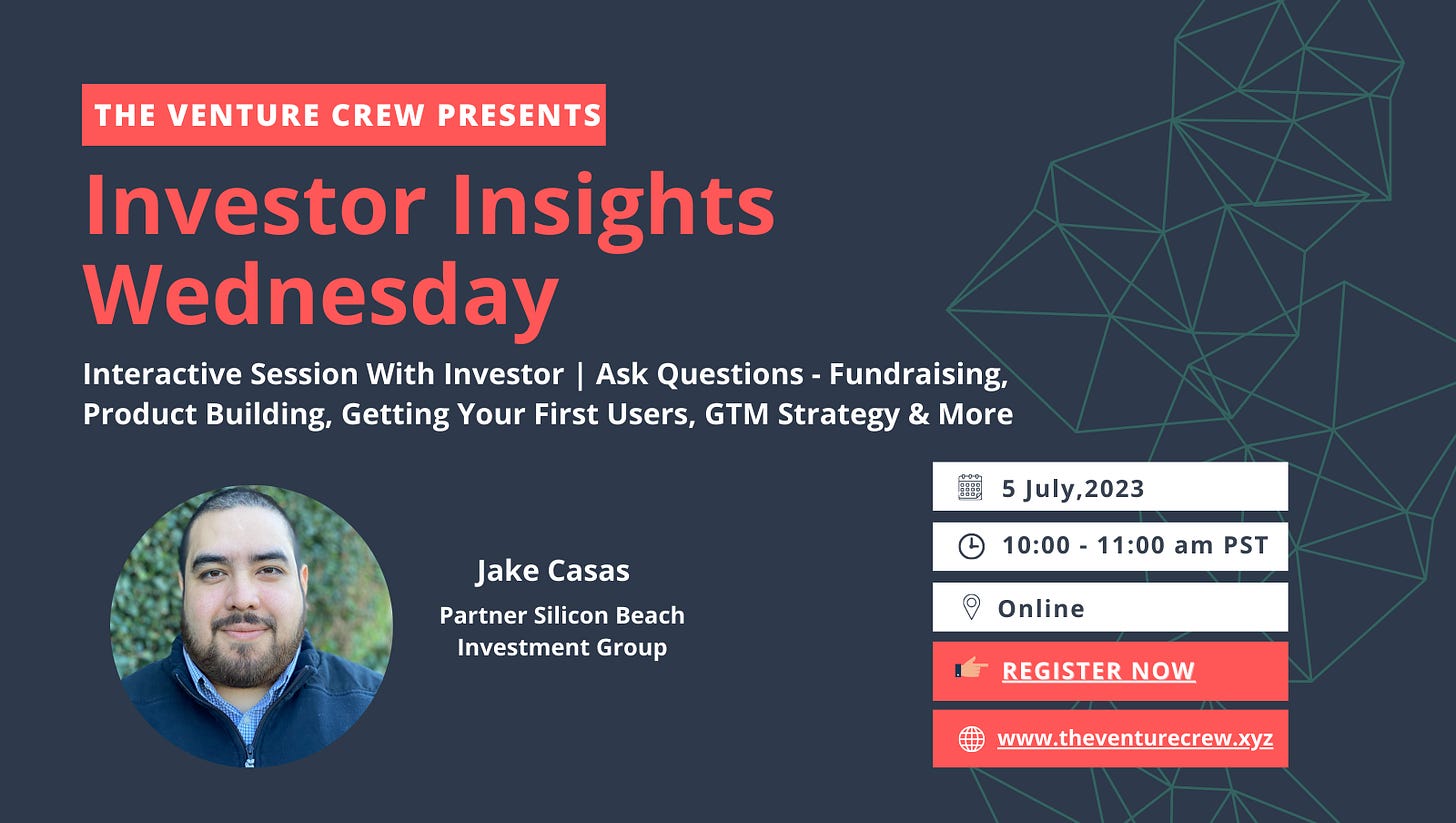Decoding Startup Valuations with the Venture Capital (VC) Valuation Method
VC Valuation Method | Venture Capital Remote Jobs | Investor Insights Event Info
Hey there!
I have been speaking with multiple founders and found that they always wonder about how the VC firms come up with the valuation number for a startup, What are some of the methods they generally used to calculate it and can I calculate it? If you also have this question, I hope it will get clear in this newsletter. I will try to answer each of these questions with a simple example to get a clear idea.
So, when it comes to determining the value of a startup, venture capital firms have a wide array of methods at their disposal. From the Berkus Method to the Scorecard Method, and from Comparable Company Analysis to Precedent M&A Method, there are various approaches to calculating startup valuations based on their stage.
However, one method that holds significant importance in the venture capital world is the VC Valuation method. This method is commonly used by VC firms, especially when evaluating pre-revenue stage startups with an eye on future exits. In this newsletter, we'll take a deep dive into the VC Valuation method, demystifying its mechanics with the help of a simple example.
So, grab a cup of coffee and get ready to unravel the mysteries that lie behind those intriguing valuation numbers!
Join 3400+ forward-thinking individuals who are unlocking high-signal, curiosity-inducing content every single day in our VC Newsletter.
The VC Valuation method is generally used by VC firms to evaluate pre-revenue stage startups with an eye on future exits. It generally comprises 6 steps:
Estimate the capital required for the startup
Financial Forecasting
Timing of VC Exit
Multiple at Exit
Desired Rate Of Return of VC
Ownership stake of VC Firm
Let’s understand this with one simple example,
Example:
Suppose a start-up looking to raise $5 Million and has a total of 1M shares outstanding.
After doing financial forecasting you find that the startup’s EBITDA after 5 years is $12M. And VC firm also wants to exit after 5 years.
And EBITDA Multiple = 7X (Industry Multiple for most of the startups)
So at the time of exit the startup will value at = 7 * $12 M = $84 M
and Desired VC Rate of Return = 30%
Future Value of Investment =
$5 M * (1+30)^5 = $18.6 M [ Considered As FV = PV *(1+R)^t]
Hence the required ownership by the VC firm = $18.6 M / $84 M = 22.1%
The post-money valuation of the company (PV) = $84M / (1+30%)^5 = $22.6M
Pre-Money Valuation of company = $22.6 M - $5 M = $17.6 M.
Hence $17.6 M is the current valuation of the startup considering the future EBITDA Multiple and other assumptions.
Also, outstanding share = 1M
Price Per Share = $17.6 M / 1M = $17.6
Total Number of Shares Post Money = $22.6M / $17.6 = 1.28M
That's it about the VC valuation method. So simply follow the six steps you will easily come up with the startup valuation number.
Today’s VC Job:
Marble Venture - Analyst Intern - Remote - Apply
Proptech1 - Impact Investor Internship - Remote - Apply
Cento Venture - Analyst Intern - Remote - Apply
Also, don't forget to join our Slack community, The Venture Crew, to connect with like-minded startup enthusiasts and founders.
📢 Join Us: Investor Insights Wednesday - An Interactive Session With Jake Casas
Excited to share about an online event - "Investors Insights Wednesday - an interactive session with investors". We are inviting all crew to join the session and ask your burning questions to our guest speaker.
An Interactive Session with Investors - Don't miss this opportunity to interact directly with Jake Casas and ask your burning questions.
Date: 5th July 2023
Time: 10:00 AM - 11:00 AM PST
Online Event: (Zoom Call)
Secure Your Spot ( Registered now) - https://lu.ma/crewinvestorinsightsI
For more please visit our website - theventurecrew.xyz
By - The Venture Crew!







Interesting read! Few Qs
1. Isn’t it a bold assumption to presume EBITDA positive in 5 years? Conscious it’s profitability > growth currently though
2. Aren’t these positions held for longer? 5 years of a 10 year fund that likely will double dip on its best companies sounds short
3. Do you think founders will give one VC firm/fund 20%+ at such an early stage when they need to give to multiple VCs and angels? Feels unlikely?
4. Finally, $80m return (you’ve ignored dilution ahead of exit) would likely only be interesting for funds < $200m? With larger fund sizes, sounds like they’d not be interested in this?
Thanks again!